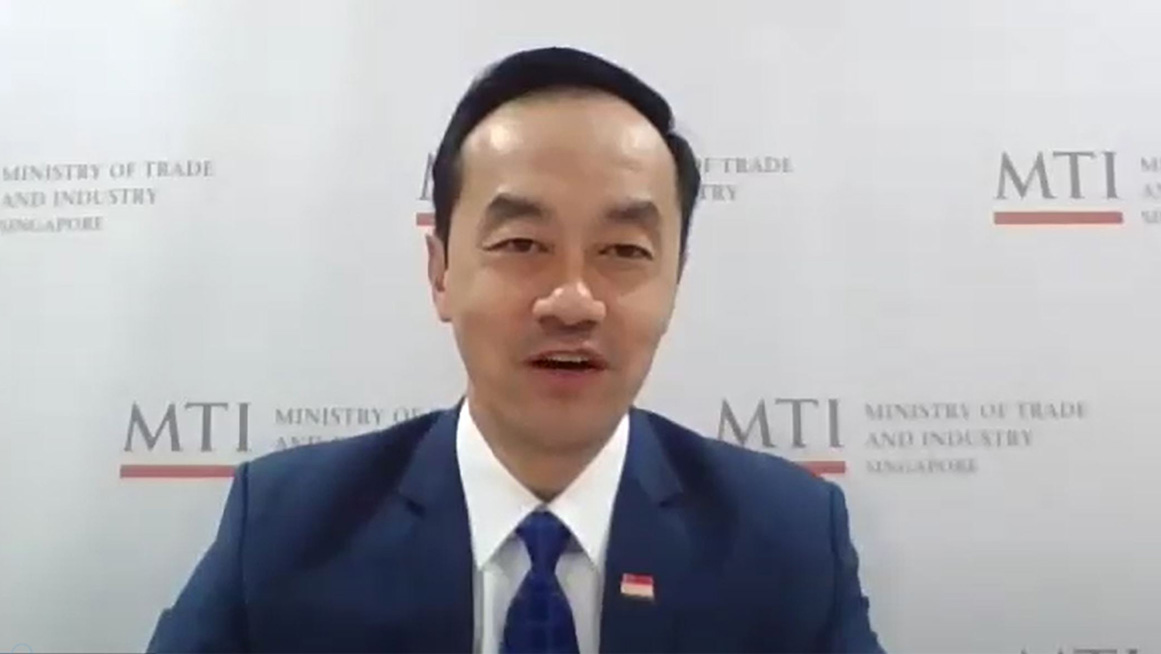Driving commercial and political engagement between Asia, the Middle East and Europe
Driving commercial and political engagement between Asia, the Middle East and Europe
Driving commercial and political engagement between Asia, the Middle East and Europe

ASEAN and China are “enhancing their cooperation” in the wake of COVID-19, a senior Singaporean minister said today [23 June].
Speaking during an Asia House webinar co-produced with Business China, Dr Koh Poh Koon, Senior Minister at Singapore’s Ministry of Trade and Industry, highlighted the “critical” importance of regional efforts “to keep markets open and ensure global supply chains remain connected and resilient.”
As part of the response to the pandemic, “ASEAN countries and China are enhancing their cooperation to mitigate the impact of COVID-19 on global and regional trade and investment,” Dr Koh said.
While there are undoubtedly major challenges facing economies in Asia, the Senior Minister also noted “pockets of opportunity” arising from the crisis.
These include the diversification of production lines in the region aimed at strengthening supply chain resilience. “Many of these shifts are towards Southeast Asia,” Dr Koh said, adding that Chinese companies are also taking advantage of the opportunity to expand into new markets.
This is one trend, of course, that was already emerging before the COVID-19 outbreak, with the trade war and rising operational costs in China compelling manufacturers to relocate. And it is one of many trends being accelerated by the pandemic, Cesar Purisima, former Secretary of Finance, Republic of The Philippines, told the forum.
Quickening trends
“COVID-19 has amplified a lot of issues,” Purisima said. “It has fast-tracked digitalisation, it has amplified the [US-China] trade war, it has amplified the very passionate debate on globalisation, it’s increased polarisation of domestic politics in many of our trading partners.”
However, Purisima argued that the crisis could also accelerate another trend: integration within ASEAN.
“Rather than focus on what’s going on outside, focus on what’s going on within,” he urged.
“The competition for investment moving forward will be more intense, given the economic problems around the world, so we have to prove that we are one market. This means harmonisation of standards, lifting a lot of the non-tariff barriers and using digital technologies to make it easier to trade across borders in ASEAN.”
These areas will be crucial to the bloc’s post-pandemic prospects, Purisima said.
“Without dealing with those issues, our ability to attract investors and take advantage of the opportunities that will arise from COVID-19 will be limited.”
Broadening BRI participation
While a more competitive ASEAN will improve the region’s economic prospects, it is clear that China will also play a key role in driving growth. Based on Q1 data, China is now the bloc’s number one trading partner, overtaking both the US and the EU, Mukhtar Hussain, Group General Manager, Head of Belt and Road Initiative and Business Corridors, HSBC, said.
One area where Beijing has the potential to play a significant role in ASEAN is the Belt and Road Initiative (BRI). The current crisis, and challenging investment environment it will herald, could see renewed efforts to engage the private sector in the BRI, Hussain suggested.
“The BRI is a significant investor in ASEAN. There’s about US$80 billion of projects that have been announced, of which there has been US$70 billion of recognisable investment,” he said.
“COVID in many ways imposes even more discipline around the need to get the private sector engaged, to promote third party cooperation and to make this a joint initiative among many countries, rather than a solo endeavour.”
Geopolitical tensions
The BRI, of course, carries significant geopolitical connotations and is one of several sources of tension between Beijing and Washington that could have implications for ASEAN.
“The US seems determined to decouple with China on a variety of fronts,” according to Xinquan Tu, Dean and Professor of the China Institute for WTO Studies of University of International Business and Economics, Beijing.
“While China is definitely unhappy about that, we have to live with that reality. The US surely has the right to choose its partners.”
Professor Tu challenged the narrative, coming from some Washington circles, that China is threatening the established rules-based order when, he said, it is the US that is “withdrawing from its commitments to a long list of international organisations” and agreements, such as the CPTPP and, more recently, the World Health Organization.
“In the case of trade policy, while you could argue that China’s policies and systems are not fully consistent with WTO rules, China has never imposed unilateral tariffs on any of its trading partners, which the US has been repeatedly doing in recent years.”
However, Professor Tu also said China should speed up its domestic reform programme and further open up its economy in order to help de-escalate the tensions with the US.
“The hub of Asia trade”
Those tensions will of course create challenges for ASEAN, but the bloc has traditionally towed a central and independent line. In part, this is down to a degree of “economic pragmatism” in the region, Hussain said.
“The ASEAN countries want a balanced relationship. They want to be able to trade in all directions, not only with China but with Europe and, indeed, the US, on an equal footing.”
This is a sentiment shared by Purisima. “China will definitely play a very important role post-COVID,” he said. “But we cannot ignore the US, the EU and our other trading partners. After all, the vision of ASEAN is to be the hub of Asia trade, and we need to make sure that that engagement is continued.”
The Asia House webinar, moderated by Asia House Chief Executive Michael Lawrence, was co-produced with Business China, and formed part of the FC Global Business Series.
